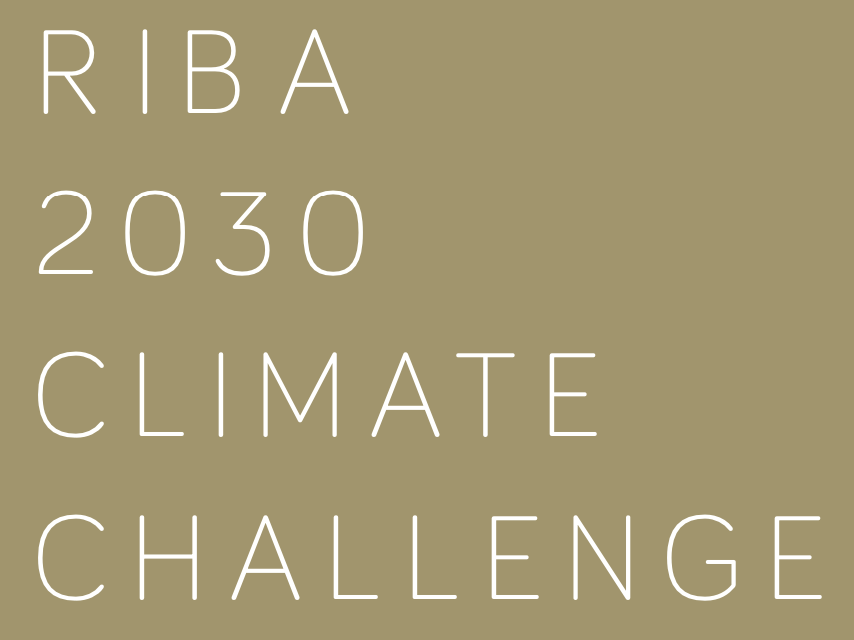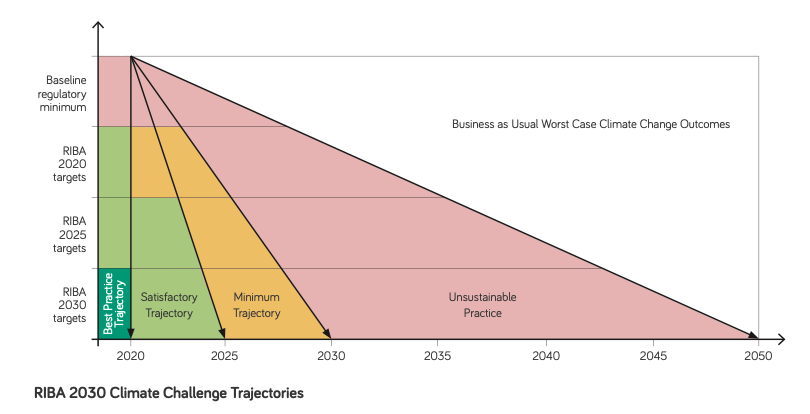We have signed up to the RIBA 2030 Climate Challenge

The RIBA has developed the 2030 Climate Challenge to help architects meet net zero (or better) whole life carbon for new and retrofitted buildings by 2030. It sets a series of targets for practices to adopt in order to reduce operational energy, embodied carbon and potable water. If all RIBA Chartered Practices meet the RIBA 2030 Climate Challenge targets, they will play their part in addressing the global climate crisis.
We have committed to do our part in proactively working towards this goal and believe that officially signing up the the RIBA 2030 Climate Challenge helps to both focus us and hold us accountable. It also gives a helpful framework to help us systematically work towards this important goal.
The RIBA have set out four targets:
1. Reduce operational energy demand by at least 75%, before UK offsetting
2. Reduce embodied carbon by at least 50-70%, before UK offsetting
3. Reduce potable water use by at least 40%
4. Achieve all core health and wellbeing targets

We are setting out below a short summary of our strategy for achieving these goals:
1. Sign up to the RIBA 2030 Climate Challenge - We have signed up, confirming publicly that we take up the challenge.
2. Get our own house in order - We will assess our current position to fully understand our current metrics and what progress we need too make across each of the four targets. We will review our existing operations and supply chain, sourcing sustainably.
3. Work smart - We will change our working patterns - We will build on the home working and flexible working patterns previously established and accelerated during the Covid 19 lockdown, encouraging online meetings and home working to reduce unnecessary travel. Where travel is needed we will encourage our staff to cycle or use public transport before using private cars.
4. Train to gain - We will embark on an accelerated staff training programme that exceeds the requirements of our core RIBA syllabus. We will develop individual areas of expertise through dedicated training in sustainable spatial design and placemaking, technical design and specification and environmental modelling and monitoring.
5. Establish champions - To achieve change someone has to champion it. We will identify one board member and two members of our team with a passion to see the challenge achieved. They will be empowered to identify, action and monitor our progress.
4. Lead by example - We will lower our own energy and water use - We are embarking on a major refurbishment of our own office premises with the goal of creating a Zero Net Carbon office by 2022. We intend that this is both our own learning vehicle and a demonstration project to inspire our clients.
5. Encourage change - We will champion sustainable design on our projects, encouraging our clients to raise their game.
6. Monitor progress - We will endeavour to monitor the performance of our clients buildings.
7. Celebrate success - We will celebrate progress and mark key milestones.
Statement from Snug's Founder:
"My hope is that this is going to challenge and inspire us to really raise our game and with that the actions of our clients. As Ghandi said ‘we must be the change we wish to see in the world.’ We all therefore need to look at how we see our role in this. Specifically I want you all to consider how you will develop your knowledge and expertise. We all have a lot to learn and a long way to go before we can say we are really leaders in this field
Ultimately we will only really achieve these worthwhile goals if we ourselves are prepared to change. The most powerful thing we can do as professionals is become experts in this area. Second to this is for us to encourage our clients to allow us to apply that expertise on the ground. That is where our real and lasting impact lies."
Paul Bulkeley RIBA

